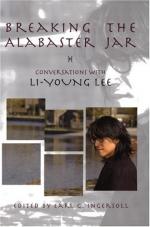|
This section contains 6,669 words (approx. 23 pages at 300 words per page) |

|
SOURCE: Xiaojing, Zhou. “Inheritance and Invention in Li-Young Lee's Poetry.” MELUS 21, no. 1 (spring 1996): 113-32.
In the following essay, Xiaojing examines the cross-cultural contexts and influences on Lee's poetry, extending his observations beyond the poet's ethnicity.
Li-Young Lee's two prize-winning books of poetry, Rose (1986) and The City in Which I Love You (1990), contain processes of self-exploration and self-invention through memories of life in exile and experiences of disconnection, dispossession, and alienation.1 While providing him with a frame of reference to explore the self, autobiographical materials in his poems also serve as a point of departure for Lee to re-define and re-create the self as an immigrant in America and as a poet. At the same time, the process of Lee's construction and invention of identity is accompanied by his development of a set of poetic strategies through which the acquired knowledge and identity are forcefully articulated and expressed.
However...
|
This section contains 6,669 words (approx. 23 pages at 300 words per page) |

|


